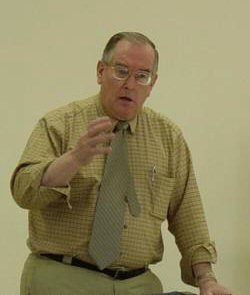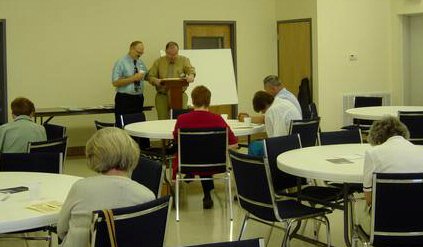Evangelism Conference
Focuses on Former
Soviet Republics


Pastor Don Richman, Founding Director of East European Missions Network of Bloomington, Minnesota, [www.eemn.org], presented a Lutheran Missions Conference on March 27, 2004 at Zion Lutheran Church in Silverhill, Alabama, entitled, "God Restores the Broken-Hearted: A Lesson in Evangelism from Russia and Eastern Europe."
Pastor Richman reported that Germans, primarily of Lutheran extraction, had been recruited to Russia by Catherine the Great in the 1700s with enticement of free land, especially in the Ukraine. The idea was to bring "modern farming methods" into old Russia with the result that those German farmers made that area, Russia's bread-basket. By the time of Stalin and the dark times of the Soviet Union, these German-speaking Russians were perceived as a threat because of Hitler, were uprooted from farmlands as they were collectivized, and were shipped by cattle car to the far eastern reaches of the Soviet Union, i.e., Siberia and the "republics" lying along the southern border of the Soviet Union.

Pastor Dave Johnson and Pastor Don Richman
open the two-day conference with prayer.
There many died, but something like a pietistic Lutheran "house church" came into being, where the faith continued to this time. "When a government uses death to govern and uses lies to continue in power, the result is much suffering (Isaiah 28:15)--true in Bible times and true today," Richman noted. Many people suffered under communism, and many Lutheran Christians died through government control systems including the Red Army, the state police, and the secret police (KGB).
 East European Missions Network staff, Chelsea Bushman (English Language Camp Teacher) (l) and Pastor Don Richman (Founding Director), presented sessions at the Lutheran Missions Conference at Zion Lutheran Church in Silverhill, Alabama, entitled, "God Restores the Broken-Hearted: A Lesson in Evangelism from Russia and Eastern Europe."
Pastor Richman noted that today there are little pockets of primarily German-speaking Lutherans across the former Soviet Union. Under the freedom that is present now, groups from Siberia to the former Baltic Soviet Republics, are coming together and reorganizing as a Lutheran church. A similar phenomenon is occurring in Russian-speaking Lutheran churches, and in a number of other national Lutheran groups that were formerly in the Soviet camp.
There is a tension between churches that have been "state" churches under communism and those churches that resisted subservience to communist dictates. A number of US church groups, primarily those affiliated with the National Council of Churches, supported Soviet churches that toed the party line because they were state institutions. As little pockets of independents, the so-called "house churches" become visible, it is apparent that there is a need for their brothers and sisters in the West, to support them and their validity as well as the national churches in East Europe. These independents, regardless of where they are in the former Soviet block, tend to be Lutheran pietists or from that stream of Lutheranism that has stressed that a Lutheran Christian 1) can know he has salvation, 2) can know he has eternal life with Christ, 3) can experience the presence of the Holy Spirit in his life, and 4) can live out that life in good works.
East European Missions Network has been partnering with churches in the former Soviet block since before the break-up of the Soviet Union. It seeks to build bridges of fellowship with churches that have little or no resources for evangelism, an activity banned by those Soviet rulers but now permitted. (Evangelism may be defined simply as "the sharing of the Good News of Jesus Christ with another.") However, windows of opportunity for the evangelical West to help these people are narrowing. Some foreign church groups have been expelled from Russia in just the past month or so. Others have established Bible schools, colleges, and seminaries, but have experienced state monetary demands to continue operation. For example, in one former Russian republic, a functioning college has been told it must close unless it can obtain or prove it possesses a half million dollars of equity--an almost impossible demand given the poverty of some of these countries.
There are other activities that are still welcomed by most East European countries and that relates to language camps where foreign nationals come into the country to teach English (in our case, folks from the US). EEMN will be taking a group of 50 this late spring to the northwestern part of Russia to do precisely that, but the text book used will be the English Bible. Pensacola Bible College freshman Chelsea Bushman from Castalia, Iowa, accompanied Pastor Richman for a portion of his seminar and shared first hand experiences of working with a group of 5 or 6 youngsters in Russia. She discussed training methods and results. A number of participants often receive a saving faith, assurance of salvation, and the gift of the holy spirit through such teaching. Long-term international relationships do result as students and teachers stay in touch.
At the conclusion of the two-day seminar, Director Richman proceeded to Destin, Florida, to discuss joint plans for church and people building in East Europe with Churches Alive International's Board Chairman Douglas Anderson and Central Eastern Europe Project Leader William Weise.
When asked what is the greatest need for East European churches, Richman noted that there is a history of bitterness and suffering among the peoples and the churches of the former Soviet Union. East Europeans, just like us in the west, are people who need a spirit of forgiveness which is preceded by repentance. Repentance is the Christian concept of recognizing wrong, asking for forgiveness, receiving it from those who have been wronged, and then continuing on in life as one who is new and fresh to life. Richman notes that "it is the blood of Christ that ultimately cleanses our sin and allows newness of life (1 John 1:7)." The church needs such forgiveness.
A second great need is for pastors who can enable the laity to minister to their peers in the church. The church's history in the Soviet block and its personnel may be a great barrier to actual ministry. Thus there needs to be a freeing of the Holy Spirit to work among both clergy and people to serve one another in the church of Eastern Europe.
Richman stressed that we have learned that the church is strengthened by those who have suffered through the tribulations of communism, and we now need to apply that strength to the sharing of the Good News with those inside and outside the church. Thus, the proclamation of the Gospel, what the evangelical community calls the Great Commission (Matthew 28:18-20), becomes strategic for the growth of the church in Eastern Europe so that those who have not heard of Jesus may ultimately be incorporated into the life of church.




|
|
|
|